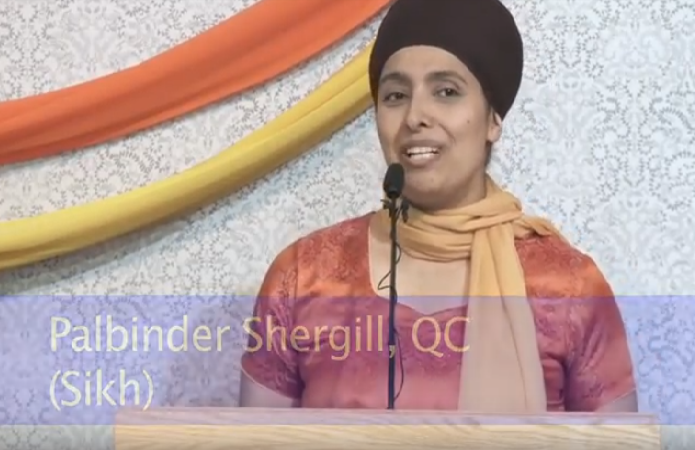The World Sikh Organization (WSO) of Canada is a non-profit organization. As an advocate for human rights in Canada, Punjab and around the world, WSO Canada has been involved in several significant court cases. This has helped develop Canadian human rights laws and customs.

PalbinderKaurShergill was a keynote speaker for the Power of Spirit in 2013,a program series produced by the Multifaith Action Society of BC that focuses on the various ways in which faith and spirituality have helped BC's diverse religious communities to overcome adversity throughout history and into today.
Background
The WSO was formed partly in response to violent attacks against Sikhs in India during the 1980s. On 4 June 1984, thousands of Sikhs commemorated the martyrdom of Guru Arjan at Harmandir, the Golden Temple, in Amritsar, India. On that day, the Government of India launched “Operation Blue Star” to expel supporters of Jarnail Singh Bhindranwale, who had based themselves in the complex since 1983. The military attack on this gurdvārā — a place of worship and community for Sikhs — killed thousands of pilgrims, destroying the Akāl Takhat and many of the Sikh Reference Library’s holdings.
On 28 July 1984, the World Sikh Organization (WSO) International was created in New York as a group devoted to nonviolent change in Punjab. Lobbying for global support, the WSO wanted to end the destruction of Sikh national monuments, memorials and artefacts and to create an independent nation — Khalistan.
WSO Canada
The Canadian branch of the WSO became increasingly active in national affairs. On behalf of their community and others, WSO Canada’s actions are consistent with global human rights and the tenets of Sikhism.
Despite this commitment, WSO Canada has often defended itself against perceptions that it condones terrorism. This was particularly the case in the wake of the Air India 182 bombing in 1985. The organization attained intervener status with the 2006–10 inquiry into the tragedy, which was led by retired Supreme Court of Canada justice John Major.
What is an Intervener?
An intervener is a person or organization who can present submissions to the court, even though they are not directly involved in a case. They are granted such status because they bring knowledge to the court or tribunal that the parties involved do not have. Special interest or advocacy groups with an indirect stake in a case use intervention to submit their expertise to the court, particularly in matters of public interest.
Significant Cases
WSO Canada first applied as an intervener in a court case on behalf of Baltej Singh Dhillon. Dhillon applied to the Royal Canadian Mounted Police (RCMP) in 1988, but his beard and turban were not permitted by the force’s dress code. For Khālsā Sikhs, the “five Ks” are crucial measures of devotion to the faith: kes, kaṅghā, kaṛā, kirpān and kach. Kes means that natural hair is to be worn, undisturbed, and covered by a turban or dastār. Dhillon was allowed onto the force in 1991 and won his case at the Supreme Court of Canada in 1996.
WSO Canada worked with the Canadian Jewish Congress (CJC), another faith advocacy group, in November 1993. The two organizations challenged the policy of certain veteran legions in the West that banned hats and headgear inside their halls. The challenge was started by Lt. Col. Pritam Singh Jauhal, a Second World War veteran, had been denied entry into the Newton Legion in Surrey, British Columbia. The policy was exclusionary for Sikh and Jewish patrons who wore religiously stipulated head coverings. Together, WSO Canada and the CJC supported such patrons until they were permitted entrance into legions across the country.
In 2004, WSO Canada again cooperated with the CJC in Syndicat Northcrest v. Amselem. This was the first time that WSO Canada was an intervener in a case unrelated to Sikhism. This was also the first time that a religious group participated in a court case, at its own cost, to support the religious rights of members from another faith community. In this case, Moïse Amselem and his Jewish neighbours erected sukkahs (huts) on their condo balconies during Sukkot. The building manager, Syndicat Northcrest, forbade structures from being built there. The Supreme Court of Canada ruled in Amselem’s favour when it decided that expert testimony cannot outweigh a person’s understanding of their own religious faith.
In 2006, WSO Canada first intervened at the Supreme Court of Canada for Gurbaj Singh Multani against Commission scolaire Marguerite-Bourgeoys in Montreal, Quebec. Multani was a high school student in Quebec who wanted to wear his kirpān. Although the school administration disallowed it, WSO Canada’s legal counsel, headed by Palbinder Kaur Shergill, QC, helped convince the court of the kirpān’s religious significance and that it was not a safety risk.

 Share on Facebook
Share on Facebook Share on X
Share on X Share by Email
Share by Email Share on Google Classroom
Share on Google Classroom